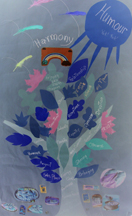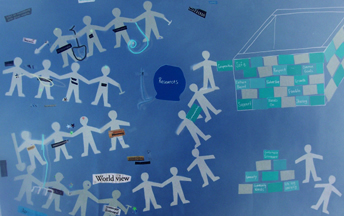The Learning Circles Project |
||
| Summary - Urban by Guy Ewing |
||
A city is not a community. It is a complex society in which communities can develop spontaneously or be created. Communities develop spontaneously in neighbourhoods where people interact. But they can be also be created by people who do not know each other as neighbours, but who have come together or been brought together for some purpose. Urban learning circles are communities of this kind. Immigrant women come together to provide each other with support. Seniors come together to address health issues. Psychiatric survivors come together to create a place to learn and socialize together. In the Indigenous and non-Indigenous rural communities in this study, learning circles also bring people together for particular purposes: to explore family history, to address fisheries issues. But in rural communities, the members of a learning circle already know each other in the geographical communities. In urban communities, people who are connected through learning circles may not be connected in any other way. The learning circles create completely new connections between people. Sometimes, these connections develop out from learning circles, creating a network of connections, a widening community within the city, with the learning circle at the centre. The Multicultural Women’s Group is an example. This group began as a breakfast club/support group for women in the Jane-Wilson area of Toronto. It has brought together immigrant women from diverse cultures. Although these women all live in one housing complex, they did not necessarily know each other as neighbours. Many were living in isolation in their new country, in a neighbourhood which does not provide many opportunities for people to interact. All of the learning circles that we encountered are similar, although there are variations on the theme. The learning groups at the Parkdale Activity-Recreation Centre (PARC) bring together psychiatric survivors in an area of Toronto with a large population of psychiatric survivors living alone or on the street. The Valuing Elders Group brings seniors together for storytelling. The Health Action Theatre by Seniors (HATS) brings seniors together to address health issues through popular theatre. The Hershare Group at Nellie’s shelter is similar to the other urban groups in that it was not created by people who know each other within a traditional geographical community. The Stratford Learning Group is somewhat different in that the community created by this learning circle for developmentally challenged adults has connected with a larger community of supporters within this small city that provides employment opportunities and other kinds of support to the learning circle and its participants. But, even in a smaller city like Stratford, the creation of the learning circle came first and the connection to a larger community developed out of this initiative. The connections were not the natural result of living together in a small place. Urban learning circles are often initiated by staff at community organizations. Learning circles have also been initiated by advocacy groups (in the case of the Asset Mapping Research Project, described briefly in the Snapshots section) by church groups (in the case of the Stratford Learning Group) and by wealthy individuals (in the case of the Valuing Elders Group.)
Staff in community organizations initiate learning circles because of perceived need, often in response to requests by participants in sponsoring community organizations. For example, the Multicultural Women’s Group was initiated by a staff person at Doorsteps Neighbourhood Services when a participant came to her and spoke of the need for a support group for immigrant women. The Literacy Group at PARC was created by a staff person at Parkdale Project Read and a staff person at PARC as the result of lobbying by a participant in both of these organizations. The circles are supported through funding that supports the general operation of the organization, or through project funding or through the donation of staff time. Organizational support for learning circles is not a recognized category for funding. The lack of dedicated funding for organizational support for learning circles creates challenges for supporting organizations. It limits the amount of time that staff can dedicate to facilitation and planning for the groups. It does not allow time for networking with other learning circles and reflecting about learning circle process. It makes it difficult or impossible to provide learning circle participants with supports such as transportation and childcare. Staff who work with learning circles feel that dedicated support would be useful. But such support would have to be flexible enough to allow learning circles to maintain control over process. Urban learning circles, like all learning circles, need to be welcoming, supportive, flexible, self-managed and exploratory. (See the Introduction.) Staff in supporting organizations stress that learning circles can only be flexible, non-hierarchical, self-managed and exploratory in situations where they are supported but not overly regulated. An interesting model for supporting learning circles is provided by the Federated Women’s Institutes of Ontario (FWIO). Women’s Institutes have supported learning circles in rural Ontario for over a hundred years. Since 1919, these Women’s Institutes have been supported by a FWIO, which allows for the province-wide sharing of resources and support. For example, a Women’s Institute that wants to explore health issues can rely on the Federation to provide materials, speakers, tools for planning events and workshops. FWIO demonstrates how grassroots learning groups can create networks of support. Currently, FWIO is developing contacts with existing women’s groups and learning circles in urban Ontario, including the Multicultural Women’s Group that was part of this study. So it appears that urban learning circles will benefit from the well-established networking experience of this traditionally rural organization. But, again, funding is an issue. In recent years, FWIO has sought government and corporate support to carry on its work. In this study, we found that learning circles are an important part of the fabric of lifelong learning in the urban environment. They create new communities among people who did not previously know one another by establishing places where people with common needs and purposes can learn together. These new communities are often created by existing community organizations in response to community needs. They are supported by these organizations through various kinds of funding. Additional funding specifically dedicated to the needs of learning circles would strengthen these learning circles, as long as this funding does not disrupt the self-management of the learning process. Support for networks of learning circles is another way in which the potential of learning circles as places for inclusive lifelong learning could be enhanced. |
||

